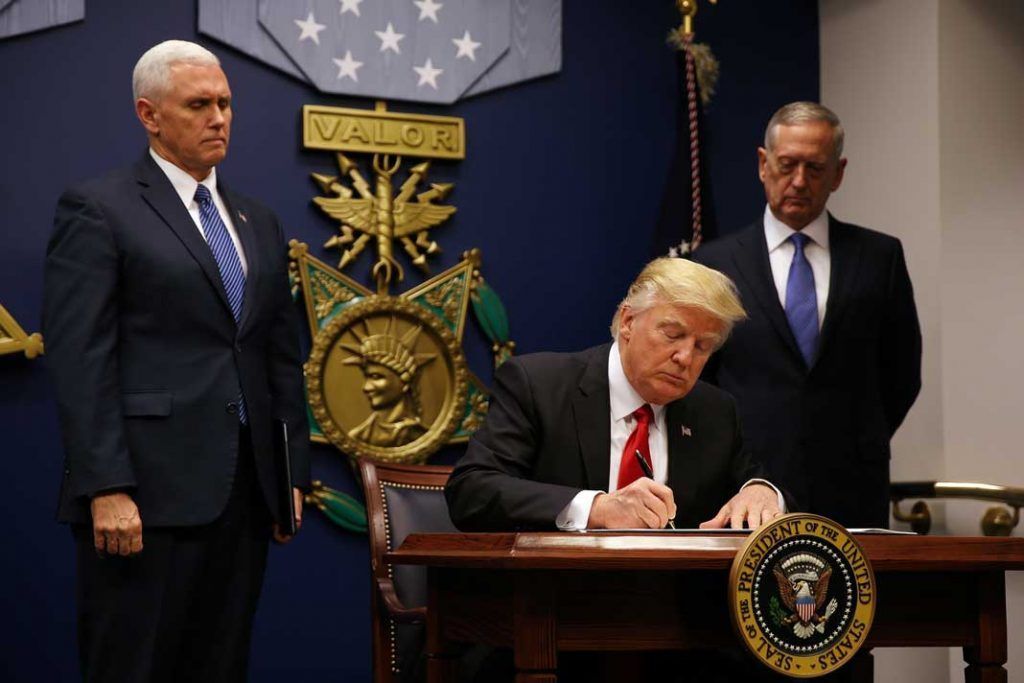March 08, 2017
By Peyman Pejman
The Trump administration’s unveiling of a new version of the travel ban to the United States from six mainly-Muslim countries, albeit an improvement, still remains discriminatory towards minority communities such as Iranian-Americans. Community organizers in America are prepared to help those facing problems.

On March 6, 2017 the Trump administration unveiled the revised version of new travel restrictions, originally issued in January but blocked by federal courts. Monday’s announcement had differences in optics and content as compared to the previous order.
Back in January, President Donald Trump appeared in front of television cameras to sign the order. On this occasion, however, it was left to Secretary of State, Rex Tillerson, and Secretary of Homeland Security, John Kelly, to read statements in defense of the executive order. The White House only released a photo of President Trump signing the directive.
There were differences in content as well. Iraq, an ally of the United States in the fight against the so-called Islamic State, was removed from the list. While the previous ban included a blanket ban on the entry of Syrian refugees, the new order puts in place a 120-day freeze which can be renewed.
More importantly to many in the Iranian-American community, as well as to citizens of the other five nations mentioned in the new ban – Syria, Yemen, Somalia, Libya, and Sudan – those holding U.S. green-cards will be allowed to travel to the United States without restrictions. Approved refugees and those already in possession of a valid visa, too, can continue to travel to the United States.
While the previous order was enforced immediately, the new ban will go into effect on March 16 and will allow travelers in transit to continue their trip when the new executive order takes effect.
Civil rights activists say while the new travel ban is an improvement over the previous version, it is still discriminatory and unconstitutional. Cyrus Mehri, an Iranian-American civil rights lawyer told Kayhan London, “It is an improvement on the prior executive order, but the potential illegality of it and the fundamental way it has been prepared remains the same. It is still improper and has the same constitutional objections as the one issued in January.”
Mehri, who filed a discrimination lawsuit on behalf of a number of Iranian-American organizations last month, said the Trump administration has asked the courts on a number of occasions to put the case on hold, but the courts has dismissed all administration requests.
Meanwhile, Leila Mansouri, head of the D.C. chapter of the Iranian-American Bar Association (IABA), says she and her lawyer colleagues continue to be available to address any questions and concerns that community members might have. They are also in contact with federal, state, and congressional sources to ensure better implementation of the new executive order.
IABA was instrumental after the January order in helping the Iranian-American community in two ways. First, its members created an online database through which passengers could send in their flight and visa information so Mansouri and her colleagues could track the travelers upon arrival and identify any problems, when and if passengers did not clear through the customs. Second, the volunteer teams of lawyers and translators provided any translation, communications, or networking services needed at various airports.
“We are creating a new tracking database to see if anyone is going to have problems with their visas. We continue to receive email questions and respond to them,” Mansouri told Kayhan London. “We are also maintaining our lobbying efforts with state officials to arrange meetings, as well as planning town hall meetings in New York and D.C. to answer questions from the community members,” she added.
Mansouri said it was important that Iranians wanting to come to the United States to understand how the new executive order might affect their case. “If you already have a visa in your passport, you are clear to travel. But if the embassy accepted your application but it is pending clearance, given that the new order maintains a 90-day travel ban, it might take a while before you get the visa,” she added. While IABA has not mobilized its volunteer networks at airports yet, because the new executive order does not go into effect until March 16, she said those in need of help will receive assistance.
“Networks and airport officials have our contact information. If anyone is in need of our services, the officials or the individuals can contact us,” she said.
Mansouri also advised Iranian-Americans to continue their lobbying efforts against the travel ban. “I encourage everyone to call their House and Senate members to say that, as taxpayers, they are opposed to this. It is really important for everyone to remain engaged,” she said.

